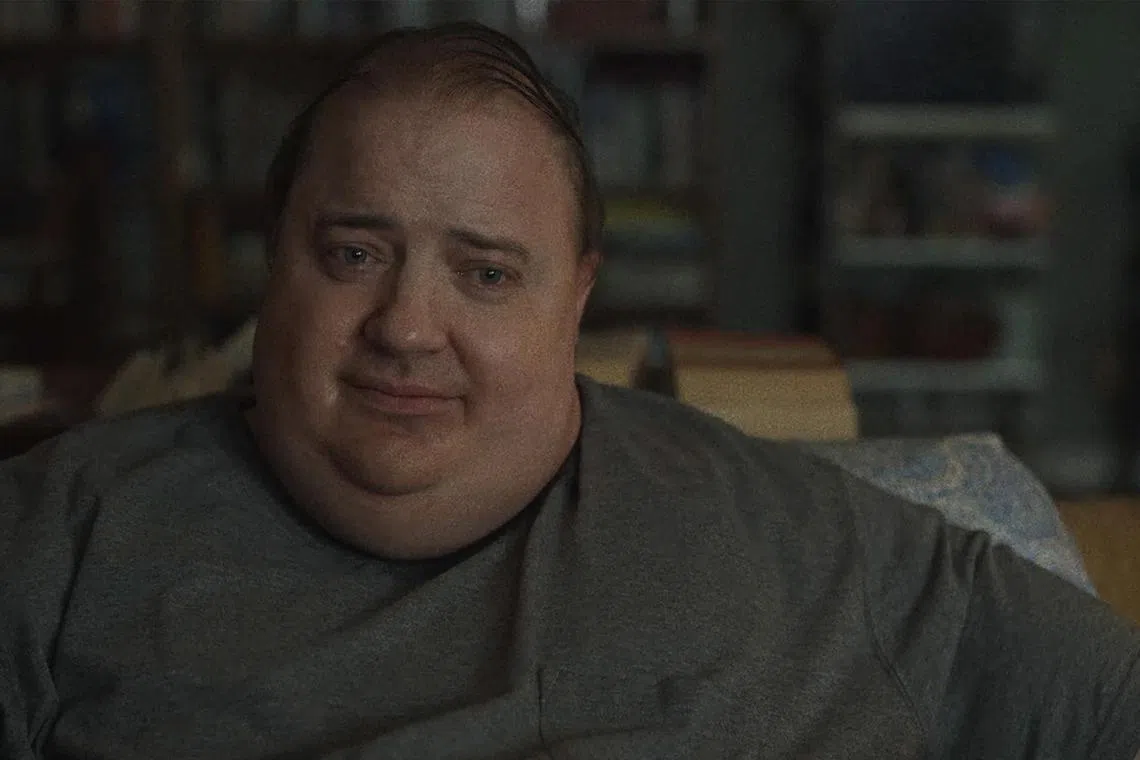At The Movies: In The Whale, a man is imprisoned by grief and his own body
Sign up now: Get ST's newsletters delivered to your inbox

The film, The Whale, stars Brendan Fraser.
PHOTO: MM2 ENTERTAINMENT
Follow topic:
The Whale (M18)
117 minutes, opens on Thursday
4 stars
The story: Charlie (Brendan Fraser) is a recluse with an eating disorder. At 270kg, he is on the verge of becoming immobile. His breathing and heart issues trouble his friend Liz (Hong Chau), a nurse, but neither of them can afford life-saving treatment for him. The English teacher tutors online exclusively and, because his camera is never switched on, his students know him only from his voice. When Ellie (Sadie Sink), his estranged teenage daughter from a previous marriage, shows up, it adds more stress to his already fraught situation.
This is a movie by Darren Aronofsky, a film-maker for whom the maxim “show, don’t tell” is sacred.
In dramas such as The Fountain (2006), the Oscar-nominated character study The Wrestler (2008) and Oscar-winning psychological horror Black Swan (2010), characters are desperate.
They yearn to bring back lost love, return to former athletic glory and achieve ballet perfection, respectively. In their quest to attain impossible ideals, their bodies suffer, and Aronofsky makes sure that every gouge, nick and cut is shown.
Although this film began life as a stage production by New York playwright Samuel D. Hunter, its ideas are Aronofsky-adjacent and it is apparent why the director opted to turn the work into a movie.
Fraser’s Charlie is, like many of Aronofsky’s creations, a person defined by his fleshly prison – his bulk defines and limits him. His private burden of grief has become a public display of corpulence, a trait that causes him great shame but about which he can do nothing.
Without Charlie’s visceral presence, The Whale would have been a well-acted one-room melodrama. But the sweaty, panting, groaning essence of him adds a new dimension, one of shock.
Some scenes are disturbing enough that they undercut the sentimentality, and at times, the movie feels like a work of body horror.
Is this film, as some have alleged, exploitative? Does it go too far in showing that the obese are self-loathing individuals bent on slow suicide? These are tough questions, and similar controversies over accuracy and representation have dogged Aronofsky’s films about ballet dancers and professional wrestlers.
It is likely that he is being singled out for outrage because he is an important film-maker, while plenty of fat-phobic, racist and misogynistic material get a free pass.
Hot take: In this study of a man going through addiction and loss, Fraser’s powerful performance as a compulsive eater gives this work a profound sense of pathos.


